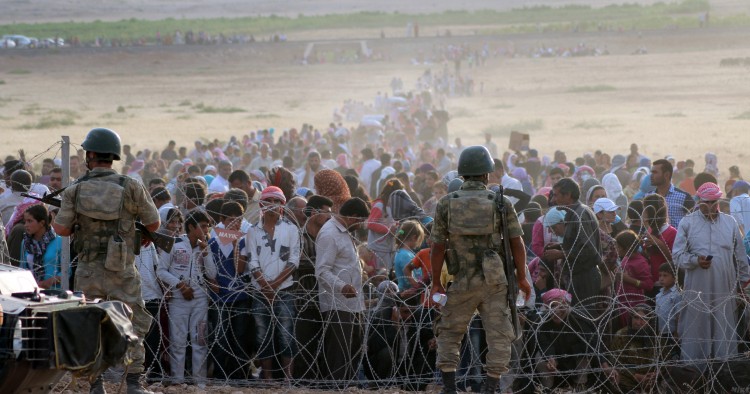In addition to economic and legal insecurity, many refugees and IDPs suffer from the immediate and long-term effects of PTSD and other mental health issues resulting from their experiences with conflict, displacement, and discrimination in their new environments. While government and NGO initiatives exist in Jordan, Iraq, and other host countries to promote mental health awareness and services in refugee communities, these resources are insufficient to address this dire need.
How can aid and development programs prioritize mental health as a key component of refugee support? What are the gaps in the regional mental health systems that must be bridged in order to serve refugee communities? What initiatives exist to empower refugee communities at the grassroots level to advocate for mental health services?
This webinar is the fourth in a series on displacement during Covid-19, an initiative to highlight the perspectives and personal impacts faced by displaced people across the MENA region.
Speakers:
Mia Atoui
Co-founder and vice president, Embrace
Mia Atoui is a Clinical Psychologist and the Co-founder and Vice President of Embrace, a leading mental health NGO in the country. She has worked in the field of mental health in Lebanon for the past 10 years and is a published researcher in the field. Since 2013, she has been active in addressing stigma and awareness around mental health in Lebanon working in coordination with the Ministry of Public Health and multiple local and international organizations to lobby for equity of care in mental health, quality rights for persons with lived experience with mental illness, and implementing projects across sectors with the aim of improving mental well-being of individuals and communities. She has extensive experience in suicide prevention in Lebanon and has been leading and advocating for Lebanon’s National Emotional Support and Suicide Prevention and Helpline in Lebanon - Embrace LifeLine (1564). She is an active member in civil society and conducts trainings to local communities and organizations across Lebanon to build the capacities of first responders and health professionals in detection and prevention of mental illness, suicide, and psychological resilience and first aid among various vulnerable groups in the community. Mia has a Master’s degree in Public Health and a Master’s degree in clinical psychology from the American University of Beirut.
Essam Daoud
Co-founder and director, Humanity Crew
Essam is the mental health director of Humanity Crew, as well as one of the co-founders. A psychiatrist in profession, Essam specializes in child and adolescent psychiatry and graduated from psychoanalytic school. He is an avid refugee mental health activist and researcher who has spoken in countless conferences and media outlets all over the world advocating for the importance of mental health support for refugees. In 2018, he became a WHO mental health expert team member, and a TED Fellow. Essam’s job in the organization is to overlook all mental health work done by our experts and our volunteers, lead and do field research, write reports on our findings, advice the organization with the proper mental health approaches to various subjects, runs the volunteer trainings, and raises awareness globally on the subject of mental health of refugees. Essam also overlooks all projects, alongside Maria, and ensures that they are medically correct and adaptable.
Mohammad Abo-Hilal
Founder, Syria Bright Future
Mohammad Abo-Hilal, MD, is a clinical psychiatrist who founded Syria Bright Future to help Syrian refugees, particularly children. Its programs include one-on-one therapy and group sessions that try to help children cope with nightmares and flashbacks.
Syria Bright Future organization also offers activities to help children deal with the day-to-day challenges of being refugees. In the Za’atari Refugee Camp, Syria Bright Future provides awareness sessions for teenagers on underage marriage and gender-based violence, and safe spaces for younger children to play.
Himself a refugee, Abo-Hilal fled Syria in 2011 after being arrested and tortured by the government of President Bashar al-Assad.
Amira Roess, moderator
Non-resident scholar, MEI; professor, Global Health and Epidemiology, George Mason University
Amira Roess is a professor of Global Health and Epidemiology at George Mason University's College of Health and Human Services, Department of Global and Community Health. She is an epidemiologist with expertise in infectious diseases epidemiology, multi-disciplinary and multi-species field research and evaluating interventions to reduce the transmission and impact of infectious diseases. Dr. Roess currently oversees several longitudinal studies to understand emergence and transmission of zoonotic infectious diseases globally, including the emergence and transmission of Campylobacter (with support from The Bill and Melinda Gates Foundation), MERS-CoV (with support from the US National Science Foundation), and the development of the microbiome during the first year of life. She completed several funded projects including on the epidemiology of HIV in Egypt (with support from the U.S. National Institutes of Health) and disparities in mortality following a natural disaster (with support from the Government of Puerto Rico). She studies breastfeeding patterns and their association with future health disparities and has also studied the impact of hurricanes on morbidity and mortality in the United States, links between food animal production and emerging infectious and zoonotic disease emergence globally, and mHealth (especially apps) technology integration and evaluations to reduce the impact of infectious diseases outbreaks, promote health care and health reduce disparities.
Photo by Halil Fidan/Anadolu Agency/Getty Images












